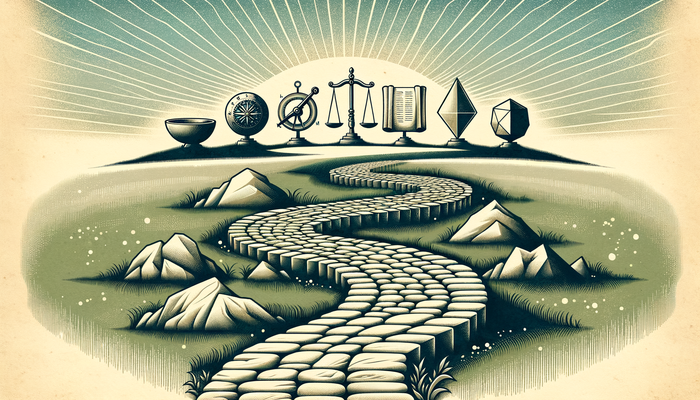From Plato to Postmodernism: A History of Philosophical Thought
Philosophy, as a discipline, has a rich and diverse history that spans thousands of years. From the ancient Greek thinkers who laid the foundation of Western philosophy to the postmodernist philosophers who questioned the very nature of knowledge and truth, the development of philosophical thought reflects the evolving ways humans have attempted to understand the world. This article explores the journey of philosophical thought, starting with Plato and continuing through the complex terrain of postmodernism, highlighting key figures, movements, and ideas that have shaped the philosophical landscape.
1. The Ancient Foundations: Pre-Socratics and Socratic Philosophy
The Pre-Socratics: Beginnings of Rational Inquiry
Before Socrates, the early Greek philosophers, known as the Pre-Socratics, laid the groundwork for Western philosophy. These thinkers, including Thales, Heraclitus, Pythagoras, and Anaximander, began moving away from mythological explanations of the world and sought natural, rational explanations.
- Thales of Miletus (c. 624–546 BCE) is often considered the first philosopher. He proposed that water was the fundamental substance of the universe, a theory that marked the first attempt to explain the cosmos in natural terms.
- Heraclitus (c. 535–475 BCE) is famous for his assertion that everything is in a state of constant flux, symbolized by his phrase “You cannot step into the same river twice.” He emphasized the unity of opposites, which was an early exploration of the complexity and paradox of existence.
- Pythagoras (c. 570–495 BCE) viewed mathematics as the key to understanding reality, establishing a link between numbers and the cosmos.
- Anaximander (c. 610–546 BCE) introduced the concept of the “apeiron,” or the infinite, as the origin of all things, expanding philosophical thought into more abstract realms.
Socrates: The Father of Philosophy
Socrates (c. 470–399 BCE) stands as one of the most significant figures in the history of philosophy. Unlike the Pre-Socratics, Socrates focused not on the natural world but on human ethics, virtue, and knowledge. His method, the Socratic Method, was a form of cooperative argumentative dialogue aimed at stimulating critical thinking and uncovering contradictions in one’s beliefs. Socrates famously claimed that “The unexamined life is not worth living,” underscoring the importance of self-reflection and the pursuit of knowledge.
Socrates did not write down his ideas, so much of what we know about him comes from his student, Plato, who recorded his dialogues. Socrates’ primary focus was the concept of virtue—he believed that knowledge of what is good would lead people to act justly.
2. Plato and Aristotle: The Classical Period
Plato: The Theory of Forms
Plato (c. 428–348 BCE), one of Socrates’ most famous students, is considered one of the most influential philosophers in Western history. His philosophical system, encapsulated in works such as The Republic, revolves around his Theory of Forms. According to Plato, the physical world is only a shadow or imitation of a higher, non-material world of perfect, unchanging Forms or Ideas. These Forms are the true reality, and the objects we see in the physical world are merely imperfect representations of these perfect entities.
Plato’s political philosophy, as outlined in The Republic, imagines an ideal state ruled by philosopher-kings—individuals who have knowledge of the Forms and can therefore govern with wisdom and justice. Plato also developed significant theories on ethics, knowledge, and the soul, laying the groundwork for future philosophical inquiries into metaphysics and epistemology.
Aristotle: Empirical Knowledge and Ethical Virtue
Aristotle (384–322 BCE), Plato’s student, broke with many of his teacher’s ideas, particularly the Theory of Forms. Aristotle believed that reality could be understood through empirical observation and logic, laying the foundations for the scientific method. He emphasized practical wisdom (phronesis) and the importance of ethics in achieving the good life. His Nicomachean Ethics presents the concept of the Golden Mean, the idea that virtue lies in the balance between extremes.
Aristotle’s influence on logic, metaphysics, and ethics was immense, and his works dominated Western thought for centuries. His concept of substance, the nature of being, and the study of categorization in his Organon had a lasting impact on philosophy, especially in the development of later scholasticism.
3. The Middle Ages: Christian Philosophy and Scholasticism
Augustine and Aquinas: The Integration of Faith and Reason
The fall of the Roman Empire in the 5th century ushered in the medieval period, during which philosophy was deeply influenced by Christianity. Philosophers sought to reconcile ancient philosophical traditions with religious doctrine.
- St. Augustine of Hippo (354–430 CE) was one of the first to integrate Christian theology with Platonic thought. In his work The Confessions, Augustine reflects on the nature of God, the soul, and the relationship between faith and reason. His conception of original sin and the nature of evil marked a major shift in Western religious and philosophical thinking.
- Thomas Aquinas (1225–1274 CE) was a pivotal figure in medieval philosophy. Aquinas sought to harmonize Aristotle’s philosophy with Christian theology, particularly through his Five Ways to prove the existence of God in his work Summa Theologica. Aquinas’ natural theology argued that human reason and divine revelation could coexist and that philosophy and theology were complementary.
4. The Renaissance and Early Modern Period: The Rise of Individualism and Rationalism
The Renaissance and early modern period brought about a renewed interest in humanism, individualism, and the scientific method. This period saw the rise of empiricism and rationalism, with philosophers focusing on the role of reason and sensory experience in understanding the world.
René Descartes: Foundational Doubt and the Cogito
René Descartes (1596–1650) is often regarded as the father of modern philosophy. In his famous work Meditations on First Philosophy, Descartes introduced the concept of methodical doubt, questioning the certainty of all knowledge and doubting the existence of everything except his own mind. His famous statement “Cogito, ergo sum” (“I think, therefore I am”) became the foundation of modern epistemology and a landmark in the quest for certain knowledge.
Descartes also contributed to the development of dualism, the idea that the mind and body are separate substances, a view that would influence discussions of consciousness and the nature of personal identity.
John Locke, George Berkeley, and David Hume: Empiricism and the Problem of Knowledge
John Locke (1632–1704) is often considered the father of British empiricism. Locke’s theory of knowledge, as outlined in An Essay Concerning Human Understanding, proposed that the mind is a tabula rasa (blank slate) at birth, and all knowledge comes from experience. He argued that individuals have natural rights to life, liberty, and property, and his ideas helped to shape political theory and the development of liberalism.
George Berkeley (1685–1753), a key figure in idealism, argued that reality is fundamentally mental and that objects only exist as perceptions in the mind. His famous dictum “Esse est percipi” (“To be is to be perceived”) challenged the very nature of physical reality.
David Hume (1711–1776), an empiricist and skeptic, famously questioned the possibility of certain knowledge. He doubted the existence of objective causality and argued that much of human knowledge is based on habit and experience rather than reason. Hume’s empiricism and skepticism profoundly influenced the development of modern philosophy, especially in relation to the problem of induction and the limits of human reason.
5. The Enlightenment and Post-Enlightenment: Kant and German Idealism
Immanuel Kant: The Limits of Human Knowledge
Immanuel Kant (1724–1804) revolutionized philosophy with his work Critique of Pure Reason. Kant proposed that human beings can never know things as they truly are (the noumenon), but only as they appear to us (the phenomenon). He argued that the mind actively structures experience according to categories like space, time, and causality. Kant’s theory of transcendental idealism emphasized that while we cannot know things in themselves, we can have knowledge of the way the world is structured and how we experience it.
Kant’s moral philosophy, outlined in the Groundwork for the Metaphysics of Morals, introduced the concept of the categorical imperative, a principle of ethics that requires individuals to act according to maxims that could be universally applied.
German Idealism: Hegel and Beyond
Following Kant, German philosophers like Friedrich Schelling and Georg Wilhelm Friedrich Hegel developed the philosophy of German Idealism, which emphasized the role of the Absolute or Spirit in shaping reality. Hegel, in particular, introduced the idea of the dialectic, a process of historical development through contradictions and their resolution, leading to the unfolding of human freedom and reason.
Hegel’s ideas were crucial in the development of later philosophical movements, including Marxism and existentialism.
6. Postmodernism: Challenging Truth and Objectivity
The Postmodern Turn
In the 20th century, postmodernism emerged as a critique of modernist assumptions about truth, objectivity, and the power of reason. Philosophers like Friedrich Nietzsche, Michel Foucault, Jacques Derrida, and Jean-François Lyotard questioned the very possibility of objective truth, arguing that knowledge is socially constructed and that historical narratives are shaped by power structures.
- Friedrich Nietzsche (1844–1900) famously declared that “God is dead” and critiqued traditional moral and metaphysical systems. His philosophy emphasized the will to power and the creation of values by individuals.
- Michel Foucault (1926–1984) examined how knowledge and power are intertwined, arguing that institutions shape our understanding of truth and knowledge.
- Jacques Derrida (1930–2004) introduced the concept of deconstruction, which analyzed how language constructs meaning and often undermines its own logic.
Postmodernism has had profound implications in areas such as literary theory, politics, and the social sciences, where questions about the nature of truth, identity, and power continue to challenge traditional structures of knowledge.
Conclusion
The journey from Plato to postmodernism showcases the vast and diverse landscape of philosophical thought. From the search for immutable truths and the nature of being to the contemporary deconstruction of knowledge itself, philosophy has continually evolved in response to new ideas, discoveries, and cultural shifts. Each movement has contributed to our understanding of the world and the complexities of human existence. As we continue to grapple with the questions posed by philosophers throughout history, we remain engaged in the timeless quest to understand truth, meaning, and the nature of reality.

